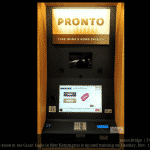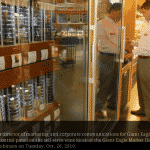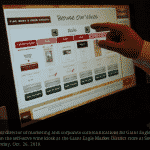Automated Wine Kiosk Update – LCB
At one time the automated wine dispensing kiosks in PA were the talk of the industry.Their ROI model which included “free
- A Pronto wine kiosk stands in Giant Eagle, New Kensington, featuring a touchscreen with options for red and white wines. The sleek wine kiosk display is highlighted in a caption dated November 16, 2010.
- Two people stand at a sleek wine kiosk in a store. One person is selecting a bottle using the control panel. Shelves with beverage cans and other products surround them. The flooring is light-colored, and the area is well-lit, enhancing the inviting atmosphere of the self-serve experience.
- A person interacts with a sleek wine kiosk, its touchscreen showcasing a variety of wine options and categories. The screen invites, Browse our Wines, as a hand points at the display in this modern retail setting.
deployment” came under a lot of discussion as well. Here was one of the first self-dispense retail automation example and case study.
What happened with the free kiosk? It has not turned out to be a free kiosk after all. Great article and write up by Kari Andren of the Triblive.

Sunday, Jan. 25, 2015, 10:50 p.m.
The state Liquor Control Board has spent nearly $300,000 in legal fees to fight a lawsuit over its “free” wine kiosk initiative.
The kiosk maker claims the LCB is to blame for forcing it out of business.
More than three years after the LCB pulled the plug on the wine vending machines in supermarkets, the agency is mired in the lawsuit with Simple Brands LLC, the Montgomery County company that developed and produced the kiosks.
“The government is doing everything it can to delay this case,” said Alan Fellheimer, an attorney for Simple Brands.
The kiosks, which LCB officials touted as a convenient way for customers to purchase a bottle of wine with their groceries, were met with criticism from opponents and skepticism from shoppers wary of a multistep purchasing process that included blowing into a device to prove sobriety.
The machines held more than 50 varieties of wine, but many failed to hit weekly sales targets. Kiosks malfunctioned hundreds of times in the first six months: from screens freezing to ID cards not scanning to wine not dispensing properly.
Read more: https://triblive.com/state/pennsylvania/7546352-74/lcb-kiosks-brands#ixzz3Q7kgSrE7
Follow us: @triblive on Twitter | triblive on Facebook
Timeline from Triblive
How it happened
2008: LCB requests proposals for a self-service, wine-dispensing kiosk. Simple Brands LLC of Conshohocken, Montgomery County, is the only bidder.
Jan. 29, 2009: LCB and Simple Brands sign a contract for 100 wine kiosks to be placed throughout Pennsylvania.
June 23, 2010: Kiosks are placed in two pilot locations: a Giant Food Store in Dauphin County and a Wegmans supermarket in Cumberland County.
Dec. 21, 2010: All kiosks are closed because of repeated malfunctions.
Dec. 22, 2010: Auditor General Jack Wagner announces a special performance audit to evaluate kiosk malfunctions and the contracting process that was used.
Feb. 1, 2011: All kiosks are back in operation.
March 17, 2011: The kiosk program reaches its height, with 32 machines operating in supermarkets such as Giant Eagle, Brown’s, Fresh Grocer, McMenamin’s, Musser’s, Wegmans, Giant and Supervalu.
May 31, 2011: Wegmans dumps the 10 kiosks in its stores because of customer complaints, a lack of sales and operational issues.
Aug. 15, 2011: Wal-Mart pulls out of its deal to install 23 kiosks in stores.
Aug. 30, 2011: Wagner’s audit is released. The report pans the program as a failure and recommends its termination, as the kiosks have not met expectations and have cost the LCB $1.12 million.
Sept. 20, 2011: The LCB officially ends the wine kiosk program.
Dec. 7, 2011: Simple Brands files the first of four complaints against the LCB with the Board of Claims.
Oct. 10, 2013: The four Simple Brands complaints are consolidated into one.
January 2015: LCB and Simple Brands are sharing evidence under discovery. A hearing on the case has not been scheduled.
What is the Board of Claims?
Filing a suit against a state agency for breaching a contract?
You’re headed for the Board of Claims, a little-known, court-like body in Harrisburg that handles contract disputes involving the state.
The board is a three-member tribunal that acts like a trial court, disposing of 30 to 50 cases annually, said Jeffrey F. Smith, chairman and chief administrative judge. An engineer and a citizen member serve with Smith.
The board generally follows the same procedural rules and process as a county Common Pleas Court.
Once both parties go through pretrial motions and discovery, their attorneys contact the board to set key dates that culminate with a public hearing — the equivalent of a trial. That can last from one day to eight weeks, Smith said.
The board decides the case and issues a written decision weeks or months later. The decision can be appealed to Commonwealth Court.
“Being a tribunal, the majority of our cases are appealed,” Smith said. “We’ve been pretty good the last 12 years I’ve been here; (we’ve had) only one minor overturn. We have a pretty good record.”
Read more: https://triblive.com/state/pennsylvania/7546352-74/lcb-kiosks-brands#ixzz3Q7jwdEQG
Follow us: @triblive on Twitter | triblive on Facebook



